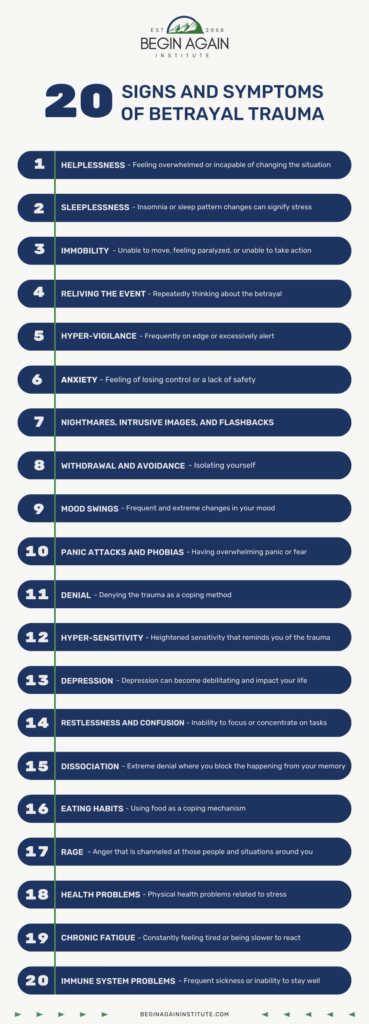When the people you trust most, like loved ones or friends, betray you, it leaves emotional wounds. That hurt may be challenging to understand or process. What is betrayal trauma? It’s that persistent feeling that you can’t trust again after a person or institution you depended on violates your trust. This post explains more about betrayal trauma and how to heal from it.
What is Betrayal Trauma?
Betrayal trauma refers to the emotional pain a person experiences after someone they trust betrays them. The result is that the person may question their judgment and feel like they can’t trust anyone again.
Betrayal trauma can come from:
- Parent or Caregiver. Your parent or primary caregiver, someone your life and welfare depends on, fails to protect you from harm or harms you themselves.
- Romantic Partner. People rely on their partners for companionship, love, and emotional support. Having this support violated can result in an inability to trust in the future.
- Interpersonal. A close friend, co-worker, peer, or individual betrays your trust.
- Organizational/Institutional. When you’re dependent on an organization for community and guidance, but it acts against what you think it stands for.
“Basically, any relationship where you trust and rely on someone and that trust is broken can result in betrayal trauma,” Laurie Hall, CPC-S, PSAP, BTRL, Partner Support Program Facilitator at Begin Again Institute said.
People often respond to betrayal by distancing themselves from the people or institutions who betrayed them. But this kind of response isn’t always feasible, especially if the betrayed person depends on that person for things like food or shelter. Other times, betrayal trauma results in the betrayed person distancing themselves from everyone to try to keep themselves safe.
Understanding Betrayal Trauma Theory
Jennifer Freyd, Ph.D. coined the term “betrayal trauma theory” to explain the trauma someone experiences when someone they trust for survival violates that trust or well-being in a significant way to cause trauma. Freyd and other researchers also looked at the differences in the levels of betrayal trauma based on survival needs. Freyd developed the concept to understand and possibly predict to what extent people remember and handle betrayal.
Freyd looked at the need to depend on the person responsible for the betrayal. While not only in the case of child abuse, anyone betrayed by the person they rely on for survival – physically, emotionally, mentally, or financially – may ignore the betrayal and block the trauma to ensure their survival. The ability to avoid, forget, or block the betrayal trauma may keep them safe while continuing to rely on the person who violated their trust for safety, security, and survival.
How Betrayal Causes Trauma
Social connections are essential to people and require levels of trust within relationships. With a caregiver, parent, or partner, part of the trust includes relying on them to provide safety, security, and support. When a person violates this deep bond of trust, it’s possible to experience trauma from that betrayal because it shatters a person’s sense of safety.
Emotional trauma can occur after a distressing event, like betrayal, or a series of events, like multiple betrayals, make you feel unsafe. What constitutes a traumatic event is specific to the person and may not be the same for everyone. If you feel frightened, unsafe, helpless, or that your life is threatened, you’re likely experiencing a traumatic event.
Trauma changes how a person’s brain functions, making you feel unsafe and fear trusting people. The emotional pain experienced when someone you trust betrays you can cause you to adopt the “once bitten, twice shy” philosophy.
“Experiencing the pain of betrayal can be different than betrayal trauma,” Laurie said. “When the betrayal is significant, and you develop the feeling that you can’t trust anyone again, persistently remains, this indicates betrayal trauma.”
20 Signs and Symptoms of Betrayal Trauma
Reactions to betrayal can manifest into more serious problems as time goes on. But they’re not just limited to psychological or emotional signs and symptoms. Sometimes they make themselves known in physical forms.
- Helplessness. Feeling overwhelmed or incapable of changing the situation. It’s possible to feel so helpless as a result of betrayal that it’s difficult to function in your daily life.
- Sleeplessness. Insomnia or sleep pattern changes can signify stress.
- Immobility. Being unable to move, feeling paralyzed, or unable to take action.
- Reliving the Event. When you find yourself reliving the traumatic event repeatedly in your mind, running through different ways you could have responded or things you think you should have noticed. Repeatedly thinking about how you discovered the betrayal.
- Hyper-Vigilance. Being frequently on edge or excessively alert. This trauma response often is because you feel like you can’t put your guard down or you’ll be hurt again. You can even be so hyper-vigilant that it impacts your ability to rest or function in your day-to-day life.
- Anxiety. Intrusive thoughts or memories from trauma can cause anxiety. The feeling of losing control or a lack of safety can also create anxiety. This anxiety can be so severe that it negatively impacts your ability to function.
- Nightmares, Intrusive Images, and Flashbacks. Reliving the experience, even when you aren’t trying to, like during your sleep or during a flashback when you feel like you’re re-experiencing the betrayal and can’t stop it.
- Withdrawal and Avoidance. Isolating yourself or avoiding certain situations or people.
- Mood Swings. Changing moods is not uncommon, but after a traumatic event, mood changes may become more frequent and extreme.
- Panic Attacks and Phobias. Betrayal trauma can cause panic attacks and phobias, like a fear of social situations, to become more pronounced or surface for the first time.
- Denial. Levels of denial of the betrayal trauma are a defense mechanism against confronting the trauma.
- Hyper-Sensitivity. Heightened sensitivity to events, people, and situations around you that remind you of the trauma you experienced.
- Depression. A common symptom of betrayal trauma, depression can become debilitating and impact every part of your life.
- Restlessness and Confusion. The inability to focus or concentrate on tasks or confusion about how to do something or what to do next. Sometimes these symptoms can negatively impact the ability to perform tasks at home and work, making concentration and decision-making difficult.
- Dissociation. Separating the traumatic event from your day-to-day life and continuing as if the traumatic experience didn’t happen. Dissociation is an extreme form of denial where a person blocks out or can’t recall complete parts of a situation.
- Eating Habits. Using food as a form of comfort in response to the traumatic event or, conversely, not eating as much or not eating at all as a response to the event.
- Rage. Anger that grows to rage and is channeled at those people and situations around you as a response to the traumatic event.
- Health Problems. Trauma can cause physical health problems related to stress, including headaches, chronic fatigue, and gastrointestinal issues.
- Chronic Fatigue. Constantly feeling tired, even when you may be sleeping excessively. Being slower to react, lethargic, and out of sorts.
- Immune/Endocrine System Problems. Chronic stress or trauma can raise concerns about the immune or endocrine system, impacting your overall physical wellness and your nervous system.
Note the frequency and intensity of any symptoms you have to help a mental health professional better treat you. Also, noting the situations that caused the symptoms can help as you work through the healing process.
“Putting symptoms in context, understanding when and why they happen, can help when addressing betrayal trauma,” Laurie explained. “A mental health professional will want to know what you’re experiencing, how frequently, and if you recognize any commonalities for when these feelings occur. In other words, do you know what triggers them?”
Healing From Betrayal Trauma
Healing from betrayal trauma is possible, especially with help and support. Working with a mental health professional who understands betrayal trauma and the resulting issues is vital to your recovery.
To heal from betrayal trauma, you must:
- Recognize It. Acknowledging, rather than avoiding, that you’ve experienced betrayal and may now be experiencing betrayal trauma is one of the first steps toward healing. Understand Trauma. Realize you did not cause the betrayal trauma. Instead, the event happened to you and is causing you pain, and your mind and body are responding to protect you in the only ways they know how.
- Avoid Blaming Yourself. It’s so difficult not to look at the betrayal and wonder what you did to contribute to or cause it. But you are not responsible for other people’s actions. The person who betrayed you is to blame for their actions. Blaming yourself or analyzing your own actions takes the focus off of the person truly responsible.
- Practice Accepting Your Emotions. It’s acceptable to feel how you feel about the betrayal. Once you recognize what happened to you and understand how your mind and body respond to emotional trauma, it’s helpful to practice identifying and even naming your emotions. For example, you may say, “I’m feeling blame today, but I know I’m not actually to blame for what happened.” This simple practice can help you work through your feelings related to the betrayal instead of letting them consume you.
- Seek Support. Look to your support systems around you, such as friends and family, to bolster you during the healing process. Having someone in your corner, advocating for your health and well-being, can make a huge difference in your recovery.
- Practice Self-Care. When your mind and body are going through a trauma, you want to do everything you can to care for yourself. Try your best to get plenty of rest, eat nutritiously, move your body, and participate in other activities, like hobbies, that make you feel valued and cared for. Also, try to avoid as much outside stress as possible as you heal.
- Get Professional Help. Reach out to mental health groups and others you can work with through the healing process. The journey from betrayal trauma to healing can be more effective with the help of trained professionals.
“Healing is possible, but you may need help,” Laurie said. “Don’t hesitate to reach out and get the assistance you need to work through these difficult feelings. You wouldn’t expect to heal a deep physical wound alone. You should expect yourself to heal a deep emotional wound by yourself either.”
Recovery is Within Reach
Working with a mental health professional is necessary to recover from betrayal trauma. Begin Again Institute understands the complexity and the dynamics of betrayal trauma and offers support groups for partners involved in betrayal. Contact us to learn more about betrayal trauma and our treatment options.






